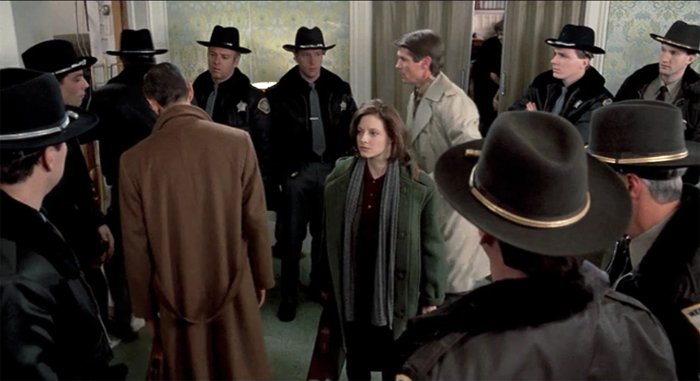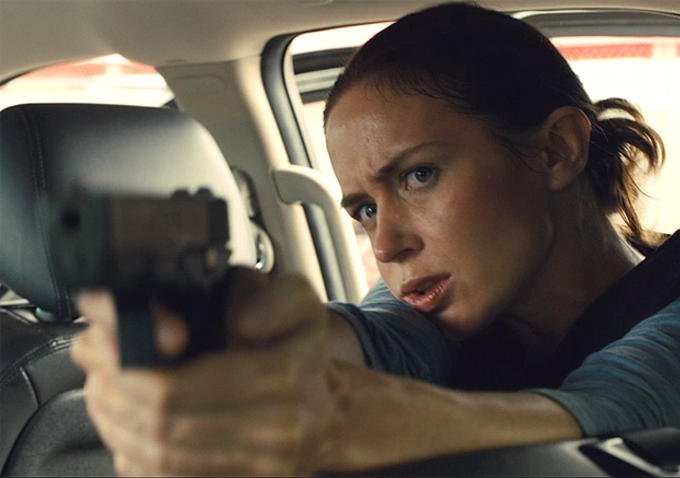Not Very Ladylike: Gender Stereotypes and How Sicario Subverts the Trope of the ‘Badass Lady-Cop’
I don’t know about you, random internet reader, but amongst many of the film’s now iconic moments there is one shot in Jonathan Demme’s genre defining The Silence of the Lambs that has always stuck out the most in my mind. No, it’s not a close up of those piercing, malevolent eyes of the carnivorous Hannibal Lecter, nor is it of Buffalo Bills’ unsettling ‘mangina dance’ as scored by Q Lazzurs’ Goodbye Horses. Rather, it’s a simple point of view shot: it occurs when FBI trainee Clarice Starling is aiding in the investigation of a brutally murdered young woman and she ends up isolated in a room, surrounded by red-blooded Virginia state troopers. A low angle pan shows us the perspective from her eyes as the just about five foots worth of Jodie Foster is dwarfed by the towering, male officers who appear to find her presence as bemusing and problematic. She becomes very literally, a victim of the oppressive male gaze.

It’s a shot which resonates because it set the precedent for how strong-willed female characters in male centric environments – and specifically those involved in law enforcement – were expected to be perceived by the men around them. Lector may have been the one who stole the zeitgeist with some ‘fava beans and a nice Chianti’ but it’s the glass ceiling breaking Clarice that has actually had the most enduring legacy. At the time, seeing a self-dependent woman play a character in a role so often associated with a man wasn’t wholly a rarity but it was enough of a novelty that the film didn’t shy away from openly dealing with it. For instance, in that aforementioned Virginia scene, Clarice found herself marginalised just because another male officer would rather not have discussed the disturbing and sexually explicit details of the case in front of a woman whose effeminate ears could never take such horrors.
Clarice Starling was the original ‘badass lady cop’ to break through to the mainstream. This was in 1991 and whatever about those depressing, present-day statistics concerning the severe under representation of female leads in film, back then it must have been a whole other kettle of patriarchal fish. As a steely eyed, determined, cognitive thinker, Starling would have been the perfect role model for any young girl of the early 90s had it been okay for them to watch films about women being skinned by a sexually confused psychopath.
For the rest of the decade, the impact of the film and the character was undeniable. Gorey murderous thrillers were now acceptable blockbuster fare and the Clarice archetype was seen in lesser mimics like The Bone Collector and the ironically named Copycat (the latter even starred Holly Hunter donning an assertive antebellum accent that’s eerily reminiscent of her influence). It’s worth noting that in both these films, that central female figure is given much more attention than the killer so even if Lecter became something of a pop culture anti-icon and would be parodied to the point of exhaustion, Clarice was the one who was showing up sincerely in these films.

There is no doubt that Foster’s performance and her purposeful, southern drawl has made the character iconic but as you would expect any watershed character to be, Clarice also displays a little bit of trepidation by today’s standard of success at any cost, a bad ass lady cop. As commanding and self-determined as she can be, Starling spends much of the film unsure of herself and her own abilities. Granted, this is due in part to the fact that the character is only an agent in training but one could also see these traits as indicative of a representation that’s only really dipping its toes in the water as opposed to jumping in entirely.
In the noughties and beyond, this is a trope that, for better or for worse, has taken a far less subtle approach. In film and in TV especially we have seen the character evolve into a much more self-assured force of nature that would remind us that “she don’ need no man” if she cared enough to remind us. In recent years the likes of Zero Dark Thirty, Homeland and The Fall have all had ball busting, virile females at their centre that set out to catch Bin Laden, other Islamist terrorists or strikingly handsome serial killers, no matter the cost. These women are the “dirty Harriets”, if you will. Adopting a scorched earth policy, they rampage through still very male centric institutions that are riddled with suffocating bureaucracy and fragile masculinity, leaving a trail of cold indifference and broken friendships behind them. Bonus points if they have some vague, high functioning mental illness like selectively bipolar (Homeland) or pseudo autism (The Bridge).
The most scandalous affront to the male run status quo these women show, however, is their fervent desire for and enjoyment of promiscuous sex. As we all know, there is apparently nothing more disruptive to the patriarchy than a woman who enjoys basic human urges as much as their male counterparts. Of course there is nothing wrong with these contemporary incarnations and it has to be said it’s quite enjoyable to see accomplished actresses like Jessica Chastain and Claire Danes sink their teeth in actually interesting roles in which they induce nervous sweating for the men around them. They are the on film feministas and they serve a reactionary purpose: If women aren’t getting the numbers of roles they should be, than at least some of the ones who do can personify that unbridled, female frustration.

Like any trope though, it can become a tad tiresome. When we recognise these recurring clichés, we start to expect them and the character itself becomes less effective as a result. And just as this staple was at risk of becoming an all-knowing, hyper-masculine Aunt Sally, a certain Denis Villenueve comes along and shakes thing up. Last year, his film Sicario was a tense, excellently seedy action flick but more importantly it had at its centre, a gutsy, proficient if vulnerable, female who both adheres to and defies these aforementioned conventions. Emily Blunt gives a committed performance as SWAT agent of high ideals Kate Macer, who finds herself embroiled in the disreputable world of black ops operations in the dark underbelly of Mexico’s cartel run cityscapes. Villenuve, as a director, must be aware of the audience’s preconceived notions as what he does with Macer is not only quite different but maybe even revolutionary: He has given us a main character that ends up being almost entirely and completely ineffectual.
It of course seems counterintuitive to suggest that having a female lead with virtually no bearing on the plot could be seen as forward thinking in any way (See: Jupiter Ascending), but in this case it just so happens to be true. What’s crucial with regards to Macer though, is the fact that Villeneuve goes to great lengths to prove how capable she is. In the film’s bravura opening sequence, we see a highly qualified woman lead a workmanlike yet fraught FBI raid on a home in Arizona. In the following scene also, when Macer is chosen by her unforthcoming higher-ups and some smarmy flip flops posing as Josh Brolin for special operations in Mexico, it further confirms to us that she is a highly efficient central figure. Villenueve however, utilises this first act so as he can later toy with the audiences’ expectations. He deliberately sets it up so it appears that Macer will be an authoritative assent so that he can later surprise us by tearing down that assumption.

In Mexico, Macer turns out to be a bit player in her own movie. What she had thought would be an expedition to take down those responsible for the deceased that lined the walls of the raided home, was instead a carefully orchestrated power move designed not to eliminate the Cartel but rather to prevent its influence reaching American soil. The orchestrators in question are the “special activities” agent Matt Graver (Brolin) and his ‘partner’ Alejandro Gillick (a grisly and unpredictable Benicio Del Toro); two men with as much scruples as Leo has Oscars. Macer, it is eventually revealed, is no more than a patsy whose presence is only required so as to legitimise the men’s covert and morally questionable actions. In many of the key scenes including two torturous interrogations that allow the plot to move forward, Macer is nowhere to be seen and also left completely in the dark.
The film has some unbearably tense sequences, and even when Macer is involved, her sense of helplessness is only exemplified. That opening, in which we saw a Macer in control and in her element, works as a counterpoint to the Mexico sequences. Consider the scene in which the task force is in an edgy standoff with cartel members at busy highway by the border .It is the most nerve shredding traffic jam ever put to film and yet our lead stays rooted in confines of the car throughout. Even if she does get a shot off, its Gillick who ruthlessly initiates. In the films jittery climax, shot in stress inducing night vision, Macer is shunted to the back of the pack while the combat occurs off camera. She is always and very conspicuously outside of the action as she is straightjacketed by underhanded politics and her own moral conflict.

Unlike some of her contemporaries, Macer is no omniscient Mary-sue. There are no scenes of her lambasting/emasculating her superiors and eventually being proven right or of finding the key piece of evidence that causes the house of cards to come tumbling down. Rather, Blunt and Villeneuve have constructed someone much less cartoonish; Macer is guarded, determined and adept but also like anyone, susceptible to the horrors she sees around her. So moments of her retching after witnessing dismembered corpses don’t make her less secure than other female leads but actually more human. Macer isn’t there to represent woman’s shortcomings in law enforcement situations, but actually the ethical complexities involved in combating barbaric violence. She is our point of view character who shares our moral compass. Villeneuve certainly doesn’t side with Graver and Gallick’s methods to restore a ‘semblance of order’ but he doesn’t outright condemn them either. As Macer is drawn further down the rabbit hole, we find that both her – and as a result our – principled values may be somewhat ignoring a cut-throat reality that the likes of Graver is willing to face head on.
More than any other of the recent driven, female officers of TV and film, Kate Macer’s vulnerabilities results in a character that harks back to its early 90s roots. But unlike Clarice, this is someone who also has the advantage of two decades of more progressive and consistent representation behind her. The important thing to note is even if she ends up as a pretty powerless protagonist, it isnt for lack of ability or for lack of trying. Even if it is to no avail, Macer is constantly questioning and pushing back against the system that undermines and constricts her. Her inaction only serves to remind us of our own helplessness in trying to combat such immeasurably difficult and multi-faceted social problems.
If anything, she is less defined by her gender than many of the other women mentioned in this article for the simple reason that her expertise is not explained to us with relation to the men around her. There is never some throwaway line about her being good “for a girl” and really, the fact that she is a woman is virtually a non-issue in that it almost never comes up. We’ve seen interestingly ineffective characters like this before but they’ve always been male (Chinatown) and Macer proves that women in action films can be similarly fascinating character arcs. They’re ‘fair game” so to speak. And more interesting roles for female actors – not just iron willed caricatures – means a more diverse selection of roles for women. Now, if they were actually allowed to direct these movies. Baby steps I suppose.
Featured Image Credit Source

